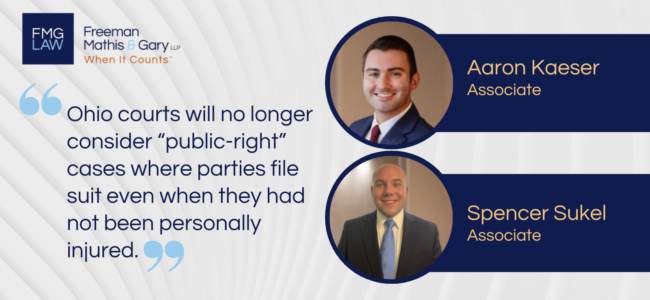BlogLine
Back to the basics: Ohio Supreme Court rejects “public-right” exception to standing requirement
12/10/24

By: Aaron N. Kaeser and Spencer M. Sukel
Last week, in State ex rel. Martens v. Findlay Mun. Court, the Supreme Court of Ohio re-considered whether citizens may litigate matters of public importance without first demonstrating any direct personal injury, pursuant to the “public-right” exception first recognized in State ex rel. Ohio Academy of Trial Lawyers v. Sheward, 1999-Ohio-123. Slip Opinion No. 2024-Ohio-5667.
A local property owner (“Relator”) filed a writ of mandamus against local courts and judges alleging they had improperly exercised jurisdiction in certain tax recovery cases. Relator did not, however, claim any personal injury or involvement in the contested tax cases. Nor did he have any legal action pending against him. Relator therefore relied on Sheward’s “public-right” exception to establish the necessary standing as a threshold to his arguments, which again, allowed citizens to litigate matters of public importance without demonstrating a direct injury.
After the Third Appellate District dismissed Relator’s Complaint, concluding he lacked standing and failed to state a valid mandamus claim, Relator appealed. Upon review, the Ohio Supreme Court affirmed. As relative to its decision, the Court took the opportunity to opine on Ohio state constitutional law and traditional standing principles at length.
For instance, the Court pointed out that while Sheward appeared to champion public rights, legal scholars and subsequent Justices alike have long questioned its validity. As such, the Court highlighted how the Sheward Court’s ruling in-practice undermined the separation of powers, enabled judicial overreach, and thus fundamentally deviated from well-established and “deeply rooted” Ohio constitutional norms. In support of this line-of reasoning, Justice DeWine cited numerous critiques of Sheward and offered examples of awkward attempts to apply the precedent by Ohio courts that juxtapose the Ohio Constitution’s mandate requiring a plaintiff to sustain actual injury.
Ultimately, the court therefore consigned Sheward “to the fate it deserves” and overruled it. In doing so, the Court thus found Relator lacked standing to sue under the now-returned-to traditional standard. The Martens Court’s decision provides a clear directive for future litigants: standing is not merely a procedural hurdle. To the contrary and going forward, Ohio courts will no longer consider “public-right” cases where parties file suit even when they had not been personally injured accordingly. As such, litigants would be well-served to apprise themselves of the Court’s ruling, which marks a notable return to the more traditional principles of standing in Ohio requiring an injury in fact.
Please contact Spencer M. Sukel at spencer.sukel@fmglaw.com or Aaron N. Kaeser at aaron.kaeser@fmglaw.com, lawyers in Freeman Mathis & Gary, LLP’s Columbus and Cleveland offices, for assistance defending claims for negligence.
Share
Save Print
